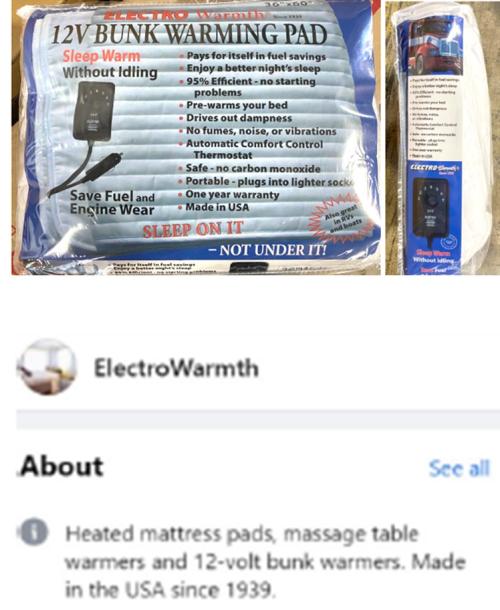Are we the only ones who remember C.W. McCall’s novelty song, “Convoy”? To paraphrase the lyrics of one of the few #1 hits about truckers, “Mercy sakes alive,” the FTC is “puttin’ the hammer down” on false claims that imported products are American-made. The agency just announced a proposed settlement with Electrowarmth Products, LLC, and owner Daniel W. Grindle, alleging their Made in USA claims for heated truck bunk mattress pads were, well, bunk.
According to the complaint, at one time, Electrowarmth used U.S.-made textiles to manufacture its mattress pads for trucks. But as a cost-cutting measure, the company moved production to China in 2019 and stopped using U.S.-made textiles. Despite that major change in production, Electrowarmth continued to represent the new Chinese-made pads as “Made in USA,” “Made in the USA since 1939,” and “made-in-America products” – claims that appeared on the product label, on packaging, or on the company’s Facebook page.

The FTC says those false statements violated the Textile Fiber Products Identification Act, the Textile Rules, and the FTC Act. To settle the case, Electrowarmth and Grindle have agreed to a proposed order that prohibits them from making unqualified U.S.-origin claims for any product, unless they can show that the final assembly or processing – and all significant processing – takes place in the United States, and that all or virtually all ingredients or components are made and sourced here. Any qualified Made in USA claim must include a clear and conspicuous disclosure about the extent to which the product contains foreign parts, ingredients, components, or processing. What about Assembled in USA representations? The company must ensure the product was last substantially transformed in the United States, its principal assembly takes place here, and U.S. assembly operations are substantial.
Based on Electrowarmth and Grindle’s inability to pay, the $815,809 monetary judgment is suspended. But if they made any material misrepresentations about their finances, the amount will immediately become due. Once the proposed settlement appears in the Federal Register, the FTC will accept public comments for 30 days.
What’s the message for other companies? Don’t sleep on the fact that modifications to your production processes may mandate changes to your Made in USA claims. The FTC has resources to help streamline your compliance efforts.

It is your choice whether to submit a comment. If you do, you must create a user name, or we will not post your comment. The Federal Trade Commission Act authorizes this information collection for purposes of managing online comments. Comments and user names are part of the Federal Trade Commission’s (FTC) public records system, and user names also are part of the FTC’s computer user records system. We may routinely use these records as described in the FTC’s Privacy Act system notices. For more information on how the FTC handles information that we collect, please read our privacy policy.
The purpose of this blog and its comments section is to inform readers about Federal Trade Commission activity, and share information to help them avoid, report, and recover from fraud, scams, and bad business practices. Your thoughts, ideas, and concerns are welcome, and we encourage comments. But keep in mind, this is a moderated blog. We review all comments before they are posted, and we won’t post comments that don’t comply with our commenting policy. We expect commenters to treat each other and the blog writers with respect.
We don't edit comments to remove objectionable content, so please ensure that your comment contains none of the above. The comments posted on this blog become part of the public domain. To protect your privacy and the privacy of other people, please do not include personal information. Opinions in comments that appear in this blog belong to the individuals who expressed them. They do not belong to or represent views of the Federal Trade Commission.
This is proof that you folks at the FTC are doing your jobs. Thankyou.
I wonder why I did not see this in the news? A LOT of products indicate Made in USA but are not. Let's see some more truth being told.
Made in America internet claims can not to be relied upon because there is NO enforcement.
Some products are "Made in America of foreign components", that should be made more clear.
This is my first post. I don't know if the time I spent here is worth it. A direct response to my email would be great.
Greg Stewart